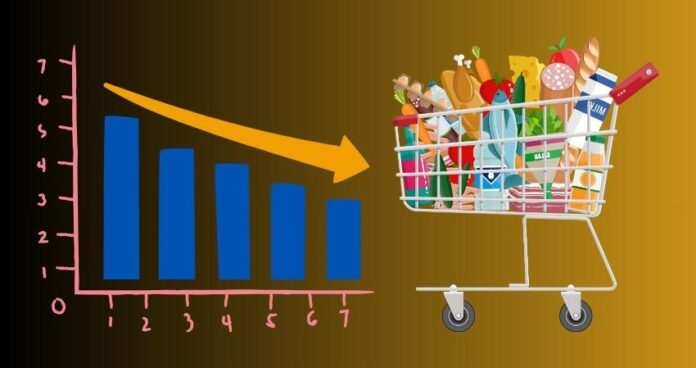The Sensitive Price Index (SPI) for short-term inflation declined by 1.7 percent in the week ending on October 19, while on a year-on-year basis, it surged to 35.45 percent mainly due to rising prices of essential food items and electricity, as per data released by the Pakistan Bureau of Statistics (PBS).
Among the 51 items measured by the SPI, prices of 14 goods increased, 24 saw a decrease in prices, and 13 remained unchanged compared to the previous week.
During the week under review, the largest weekly price increases were seen in eggs (3.44 percent), powdered salt (2.63 percent), shirting (2.18 percent), mutton (1.01 percent), beef (0.84 percent), cooked beef (0.72 percent), georgette (0.52 percent), washing soap (0.48 percent), prepared tea (0.34 percent), cooked daal (0.34 percent), potatoes (0.25 percent), and firewood (0.22 percent).
In contrast, on a week-on-week basis, the prices of onions dropped by 8.45 percent, chicken by 5.46 percent, pulse masoor by 3.38 percent, sugar by 3.07 percent, garlic by 2.24 percent, and broken basmati rice by 2.17 percent.
The items that experienced year-on-year price hike included electricity charges for the first quintile (136.89 percent), gas charges for the first quintile (108.38 percent), cigarettes (94.46 percent), chili powder (84.11 percent), broken basmati rice (81.74 percent), wheat flour (80.73 percent), rice Irri-6/9 (71.43 percent), sugar (66.29 percent), gur (61.50 percent), gents’ sponge chappal (58.05 percent), powdered salt (57.40 percent), and Lipton tea (56.27 percent).
While a reduction in petroleum prices is expected at the end of this month, transportation costs have not been affected by these price changes, largely due to the absence of a regulatory system.
The SPI has consistently remained above 30 percent for six consecutive weeks. In the previous week, the caretaker government made significant cuts in petroleum product prices, and the impact of these reductions on everyday expenses is expected to become more visible in the coming weeks.
Earlier this year, in May, the SPI remained above 45 percent for three weeks after hitting an all-time high of 48.35 percent on May 4. Factors contributing to this inflation included the depreciation of the rupee, increasing petrol prices, sales tax, and electricity bills.
Notably, this month’s report shows that monthly inflation, as measured by the Consumer Price Index (CPI), bounced back to 31.4 percent in September, marking the highest level in four months. This was primarily due to administrative hikes in electricity and fuel prices. This inflation came at a time when poverty and unemployment were already on the rise. The CPI increase was primarily driven by the increase in energy prices, while the rise in prices of perishable food items slowed down to single digits.
Electricity costs had risen by 164 percent compared to the previous year, and gas prices were up by 63 percent, even before the impending increase. Additionally, petrol prices had increased significantly, selling at Rs283 per liter. Non-perishable food items, including politically sensitive sugar, continued to see price increases. The CPI reading suggests that the government and the State Bank of Pakistan are likely to miss the annual inflation target of 21 percent by a considerable margin, despite the costs imposed on the exchequer and businesses due to the high interest rate of 22 percent.




